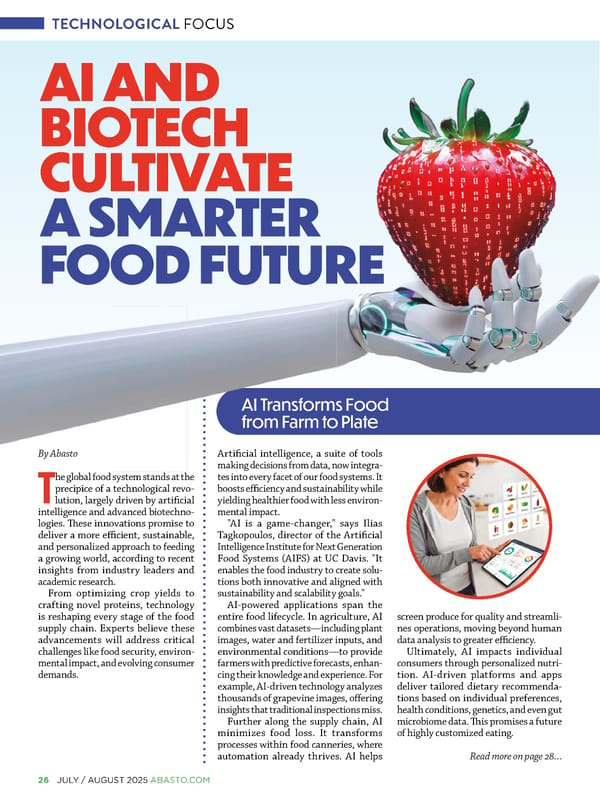TECHNOLOGICAL FOCUS 26 JULY / AUGUST 2025 ABASTO.COM Artificial intelligence, a suite of tools making decisions from data, now integra- tes into every facet of our food systems. It boosts efficiency and sustainability while yielding healthier food with less environ- mental impact. "AI is a game-changer," says Ilias Tagkopoulos, director of the Artificial Intelligence Institute for Next Generation Food Systems (AIFS) at UC Davis. "It enables the food industry to create solu- tions both innovative and aligned with sustainability and scalability goals." AI-powered applications span the entire food lifecycle. In agriculture, AI combines vast datasets—including plant images, water and fertilizer inputs, and environmental conditions—to provide farmers with predictive forecasts, enhan- cing their knowledge and experience. For example, AI-driven technology analyzes thousands of grapevine images, offering insights that traditional inspections miss. Further along the supply chain, AI minimizes food loss. It transforms processes within food canneries, where automation already thrives. AI helps screen produce for quality and streamli- nes operations, moving beyond human data analysis to greater efficiency. Ultimately, AI impacts individual consumers through personalized nutri- tion. AI-driven platforms and apps deliver tailored dietary recommenda- tions based on individual preferences, health conditions, genetics, and even gut microbiome data. This promises a future of highly customized eating. AI Transforms Food from Farm to Plate Read more on page 28… AI AND BIOTECH CULTIVATE A SMARTER FOOD FUTURE By Abasto T he global food system stands at the precipice of a technological revo- lution, largely driven by artificial intelligence and advanced biotechno- logies. These innovations promise to deliver a more efficient, sustainable, and personalized approach to feeding a growing world, according to recent insights from industry leaders and academic research. From optimizing crop yields to crafting novel proteins, technology is reshaping every stage of the food supply chain. Experts believe these advancements will address critical challenges like food security, environ- mental impact, and evolving consumer demands.
 Abasto Magazine: July / August 2025 - ENGLISH Page 25 Page 27
Abasto Magazine: July / August 2025 - ENGLISH Page 25 Page 27